|
FIRST, OUR VIEWS: |
 |
 Help at Home
Help at Home
"Pennsylvania offers various social services for citizens age 60 and up", as shown in the photo. Agape Restoration Society helps residents and others get needed assistance so they can live at home, either in our handicapped-accessible ARCs or other housing. Then "Home Health Care" and "Meals on Wheels" can go a long way toward keeping you at home! - that is, if your home is suitable for this when you need it to be.
The basic problem, however, is that most people don't want to think about such things -- until it's too late. Psychologists call this "the normalcy bias" - our brains work in terms of past experience, so we assume that everything will simply keep on going on "like normal" just as it has in the past. But when we stop to think about it (if we ever do take time to stop to think), we realize deep-down that someday we're going to die, and more likely (70% probability!) first will come the slowing down, having a hard time climbing up or going down stairs, feeling exhausted after walking 100 feet, needing a walker or a wheelchair, etc. - the old heart, back, legs, etc. are getting tired and worn out. Are YOU going to be pro-active and stop to think about it now, or will you wait until it's too late to choose which accessible housing is best for you? Then you'll have to depend on relatives - who are busy with their own lives - to take time out to do it for you.
What is an ARC - an Agape Restoration Community? Perhaps first of all we should say what an ARC is not: it is not a nursing home, a personal care home, or an assisted living center. Think of an ARC as a Christian community, an independent living facility where you have your own living unit, can move about, come and go as you please without the physical barriers of stairways, steps at porches or decks, or narrow hallways and doorways that hinder movement by people with mobility impairments. An ARC also provides common spaces for worship and other group activities so you're not cooped up at home alone.
Why an ARC? See the article "The Changing Demographics of Nursing Home Care: Greater Minority Access… Good News, Bad News": as our population ages, more and more elderly people of minority groups are being placed in nursing homes as an increasing number of white Americans move into assisted living or independent living facilities that they can afford. Will you be able to afford thousands of dollars per month for such hotel-like accommodations?
The elderly of minority groups and the poor tend to rely more on Medicaid that has strict limits of what it will provide only if medically necessary: a basic double-occupancy room with two TVs, three meals a day, limited-staff nursing care, a shower once a week, and perhaps some physical therapy to keep in shape. Picture yourself in a room with two TVs and both residents want to watch and listen to (loud!) their favorite programs -- one late at night and the other early in the morning!
But this doesn't mean that more and more nursing homes are being built: quite the opposite, in fact! Because of Medicare's and Medicaid's stricter limits on how much and what they will pay for, thousands of nursing homes have shut down in the past thirty years: see "In the Nursing Home, Empty Beds and Quiet Halls" -
"Thirty years ago, 90 percent of Medicaid dollars for long-term care flowed to institutions and only 10 percent to home- and community-based services. Now, the proportions have flipped, and nursing homes get only 43 percent of Medicaid’s long-term care expenditures.
"A report from the federal Government Accountability Office earlier this year pointed out, for example, that Medicaid covers assisted living for 330,000 people. A demonstration program called Money Follows the Person has moved more than 75,000 residents out of nursing homes and back into community settings.
"It's good news for consumers — but not so good for nursing homes. The 31 largest metropolitan markets have 13,586 fewer nursing home beds now than in late 2005, the investment center reports.
"This could prove a temporary crisis. When the baby boomers enter their 80s and need residential care, occupancy could pick up again."
But will the beds be there when the baby boomers need them? Another article, "The Need for Long-Term Care Continues to Grow", tells of the 10,000 "Baby Boomers" retiring every day: they were born from 1946 to 1965 and number seventy million people, about one-fourth of the entire U.S. population. Most retirees don't need accessible housing right at age 65: disability usually begins around age 75, so the tsunami of disabled "Baby Boomers" will likely begin in 2021. We need to be ready!
As more and more of the "Baby Boomers" leave the workforce to retire, fewer and fewer people will be paying into Social Security and general public funds while more will be drawing from these funds. This article states - "An estimated 70% of people currently turning 65 will require long-term care in their lifetime, and they will receive care for an average of 3 years." This is obviously a danger, but also an opportunity -- for Christians to form "intentional communities" to show compassion by providing accessible housing and care for the elderly and infirm.
And a fourth article, "Medicaid Cuts May Force Retirees Out of Nursing Homes", relates how people who think they have plenty to retire on find out that it's used up after just a few years, maybe even less, together with hospital bills. It tells about Alice Jacobs, age 90, who once owned a factory and horses, but eventually exhausted her savings at an assisted living center and now "relies on Medicaid to pay for her care at Dogwood Village, a nonprofit, county-owned nursing home." Wouldn't it be wiser to get "Home Health Care" and "Meals on Wheels" while living in an ARC and not burning through those savings?
See our first article WHAT SHE SAW CHANGED EVERYTHING - "UNPLANNED" - the movie 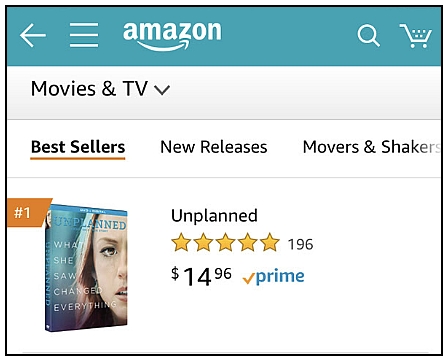 "Unplanned" is #1 on Amazon! You can get it either as a DVD or as a license for streaming it. Planned Parenthood clinic director Abby Johnson was sickened as she witnessed an ultrasound-guided abortion on a 13-week baby, so she quit her job and became an ardent Pro-Life advocate. Please consider getting this movie and showing it at your church, invite your family and friends to your home to watch it, etc.
"Unplanned" is #1 on Amazon! You can get it either as a DVD or as a license for streaming it. Planned Parenthood clinic director Abby Johnson was sickened as she witnessed an ultrasound-guided abortion on a 13-week baby, so she quit her job and became an ardent Pro-Life advocate. Please consider getting this movie and showing it at your church, invite your family and friends to your home to watch it, etc.
As you may have heard, Planned Parenthood has opted out of Title X funding because it refuses to separate its "women's health care" from its abortion business. This is required by the return to the Reagan-era rule that blocks recipients of Title X funding from 1) referring pregnant women to abortion clinics, and 2) operating under the same roof as an abortion clinic. In other words, Planned Parenthood just chose abortion over health care, giving up $60 million because it can make much more money than that by selling abortions.
Why should we be concerned about "private decisions between a woman and her doctor"? Well, because it's not just between those two: there's a father of the child who's also involved, there are parents of the woman if she's under-age who should be informed, and most important of all, there's a little human being whose life is about to be snuffed out in an extremely gruesome manner! Why is the life of an 8-week-old or 12-week-old unborn baby important, whose heartbeat is just becoming noticeable? Because all human beings are more than merely "a clump of cells" - they are created in the image of God and have a spark of divinity in their hearts: "the true light that enlightens everyone who comes into the world" (John 1:9).
Some people will argue and split hairs over exactly when this happens - is it at the moment of conception, or when the fertilized egg gets implanted in the womb, or when a doctor can hear the baby's heartbeat? Certainly, many fertilized eggs never get implanted and survive, but it's also certain that when the heartbeat is detected, there definitely exists a real, separate, little human being with its own functioning heart and brain, arms and fingers, legs and toes, and all the other organs needed. The baby isn't yet visible except by ultrasound, but it is in this world!
All humans are created in the image of God: it is also for this very reason we must protect human life up to the moment of natural death. As the article "Assisted Suicide: The Ethics, the Laws, and the Dangers" explains, assisted suicide and/or euthanasia have been legalized in several U.S. states and is hotly debated in other states. This is becoming an even greater issue as the "Baby Boom" generation, 70 million people born from 1946 through 1965, begin to reach their mid-70s and start having serious health problems. Assisted suicide is when a person requests a deadly concoction, but euthanasia has a wider meaning - putting someone to death "for their own good" when the decision can be made by a relative or some doctors, not only by the patient. It's not difficult to see the danger to society when such a decision can be made by others: remember Nazi Germany, the Soviet Union, and China!
The country of Georgia (not the state!) is in the midst of a great debate over whether to adopt a "Religion Law" - see GEORGIA: WHO NEEDS A RELIGION LAW? Such laws in the Soviet era have been used to strictly limit the number of religious organizations that can register in a given country. I have reported on many such examples in the past almost 50 years of sending out newsletters,but here's another current example: KAZAKHSTAN: OFFICIALS TRY TO FORCE REGISTRATION SIGNATURE WITHDRAWALS - by requiring 50 signatures of members to register a religious organization, the state can exclude smaller groups and can also force some of those 50 members to withdraw their signatures, thus denying the organization any legal status.
The same sort of tactic is being used in Ukraine's Crimean peninsula, currently controlled by Russian forces: see UKRAINE SPEAKS AT UN ABOUT RELIGIOUS PERSECUTION IN CRIMEA AND DONBAS. In this case, religious organizations - except the Moscow-controlled former "Ukrainian Orthodox Church" parishes - have been forced to re-register -- and out of 2,083 previously registered, only 722 have been allowed to re-register. This tactic was used during our 17 years in Russia from 1991 to 2007, after the "fall of communism," forcing many non-Orthodox churches to close their doors. Russia may no longer be officially communist, but the anti-God spirit of atheism is certainly still active there.
Make a "Quick-click" Classy Donation to A.R.S.
And click on our Amazon Smile link to shop at Amazon!
Our fourth article OVER 60% OF RUSSIANS IDENTIFY AS ORTHODOX, 1 OUT OF EVERY 6 IS ATHEIST - POLL explains that 63% of Russian citizens "identify as" Orthodox, but this includes many who also claim to be atheists and the vast majority who do not attend church except when they were baptized as infants. Just as in the West it's trendy nowadays to "identify as" transgender or lesbian or gay, after the collapse of the USSR it became trendy to "identify as" Russian Orthodox and perhaps even be baptized as an adult. But only a small percentage of Russians, under 5%, attend church regularly.
AFTER 100-YEAR BATTLE, UKRAINE WINS INDEPENDENT CHURCH FINALLY IN 2019 - our fifth article - tells the in-depth historical background to Ukraine's century-long struggle to reassert its identity as an independent nation and, as a part of that, to have its own Orthodox Church not controlled by the Mongol Empire, the Russian Empire, or the Austrian Empire. The word "Ukraine" literally means "on the border" - this area has been on the borders of those three empires and has been fought over by them for many centuries. As the article explains, in 1686 Ecumenical Patriarch Dionysius IV was held hostage by the Russian Tsar until he granted legal authority to Moscow over Kyivan Orthodoxy. Part of Orthodox theology is that each country should have its own national church with its native priests and bishops speaking the native language, and finally, Ukraine has achieved this long-desired goal.
Click on SUBSCRIBE! to receive your own free copy of Hosken-News!
NOW, THE NEWS:
WHAT SHE SAW CHANGED EVERYTHING - "UNPLANNED"
from: Live Action
 (13 Aug.) The movie Unplanned tells the true story of former Planned Parenthood clinic director Abby Johnson and her conversion into a pro-life activist.
(13 Aug.) The movie Unplanned tells the true story of former Planned Parenthood clinic director Abby Johnson and her conversion into a pro-life activist.
Abby was a "star" employee at Planned Parenthood, but that all changed after she witnessed an ultrasound-guided abortion on a baby at 13 weeks. Since that moment, she has been an outspoken advocate for the preborn and has founded a ministry, And Then There Were None, to help clinic workers leave the abortion industry behind.
This is why abortion advocates and Twitter sought to silence this movie. If a Planned Parenthood employee could change their mind, then any "pro-choice" individual could too. The movie was a box office success - an incredible feat considering the limited budget and other hurdles, including an 'R' rating and networks refusing to advertise the film.
Abby Johnson's story can change lives. It wrestles with the deepest divides and finds healing, hope, and freedom. If you only see one movie this year, see this one. Even the most hardened pro-abortion individuals can change their minds, they just need to have their eyes opened. [read more --]
GEORGIA: WHO NEEDS A RELIGION LAW?
by Mariam Gavtadze: Forum 18 News Service
 (15 Aug.) Many religious communities and human rights defenders strongly oppose Georgian government plans for a restrictive Religion Law. Instead, they call for resolving freedom of religion and belief problems by implementing recommendations made by the Council of Religions under the Public Defender. Georgia's ruling Georgian Dream Party appears to be trying to introduce a restrictive Religion Law that would limit the numbers of religious communities with legal status.
(15 Aug.) Many religious communities and human rights defenders strongly oppose Georgian government plans for a restrictive Religion Law. Instead, they call for resolving freedom of religion and belief problems by implementing recommendations made by the Council of Religions under the Public Defender. Georgia's ruling Georgian Dream Party appears to be trying to introduce a restrictive Religion Law that would limit the numbers of religious communities with legal status.
Despite the opposition to a Religion Law of many religious communities, ruling party Deputy Sophio Kiladze stated in a press release that she told a Working Group meeting that "the ultimate goal of the Working Group meetings is to develop a law to ensure freedom of confession and to protect the public interest." Yet contradicting this statement, Kiladze told Forum 18 that "the main goal of the meetings is not the adoption of the law. The most important thing is how we consider solutions to existing problems."
The State Agency for Religious Issues (SARI) has long wanted a Religion Law. Its Chair Zaza Vashakmadze told Forum 18 that before the Working Group was created he had met with religious communities. He claimed that the Religion Law idea was their initiative. Yet from 2015 the SARI has been advocating for a Religion Law. The leaders of three state-funded religious communities announced that they wanted a Religion Law: the Armenian Apostolic Church Diocese, the Jewish Union of Georgia, and the Administration of Muslims of All Georgia (AMAG). However, these leaders do not speak for everyone in their communities.
Giorgi Tumasyan of the Ardzagank Armenian Community Platform told Forum 18 that the Armenian community was not consulted about the decision. "Different community members opposed the idea of a Religion Law, and Bishop [Vazgen] Mirzakhanyan had to admit that there were mixed positions about the idea for a law. I think this initiative aims at increasing the existing state controls over religious minorities by using Soviet tactics." [read more --]
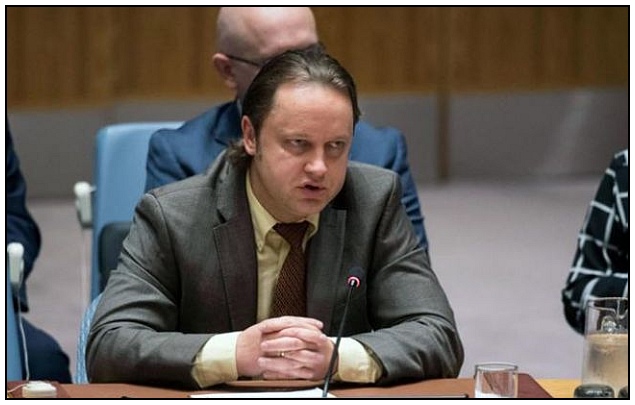 (23 Aug.) Ukraine's chargé d'affaires to the UN Yuriy Vitrenko said that the Russian occupation authorities grossly violate the freedom of conscience and religion in the temporarily occupied territories of Crimea and Donbas. Vitrenko said this during the Arria-Formula Meeting of the UN Security Council for the Protection of Religious Minorities in Armed Conflict, RBC-Ukraine reported citing Ukrinform.
(23 Aug.) Ukraine's chargé d'affaires to the UN Yuriy Vitrenko said that the Russian occupation authorities grossly violate the freedom of conscience and religion in the temporarily occupied territories of Crimea and Donbas. Vitrenko said this during the Arria-Formula Meeting of the UN Security Council for the Protection of Religious Minorities in Armed Conflict, RBC-Ukraine reported citing Ukrinform.
According to the Ukrainian diplomat, the occupation authorities launched "a broad campaign of oppression of Ukrainians on the basis of their religious beliefs." He explained that we are talking about "all religions except the Orthodox Church of the Moscow Patriarchate."
"The Russian occupation authorities in Donbas even invented the so-called 'legalization' - on the model of the Russian one - when all religious organizations, except the Orthodox Church of the Moscow Patriarchate, are required to undergo re-registration," he explained. Vitrenko added that due to such illegitimate demands, more than 1,000 religious groups recognized by the Ukrainian legislation, cannot continue activity in the temporarily occupied Donbas.
"In Crimea, the report of the UN Monitoring Mission on Human Rights 2017 notes that before the occupation of the peninsula in 2014, 2,083 religious organizations were functioning in its territories; as of September 2017 only 722 had survived the persecution campaign," he said, adding that in recent years the situation has worsened. [read more -]
OVER 60% OF RUSSIANS IDENTIFY AS ORTHODOX, 1 OUT OF EVERY 6 IS ATHEIST - POLL
from: Interfax-Religion
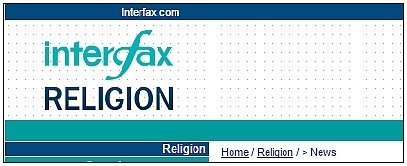 (14 Aug.) Two-thirds of Russian citizens (63%) identify as Orthodox, according to a poll done by the Russian Public Opinion Research Center (VCIOM) obtained by Interfax. According to the sociological poll, an overwhelming majority of orthodox Christians (86%) have been baptized and two-thirds of them (66%) were baptized because their parents or relatives had decided so.
(14 Aug.) Two-thirds of Russian citizens (63%) identify as Orthodox, according to a poll done by the Russian Public Opinion Research Center (VCIOM) obtained by Interfax. According to the sociological poll, an overwhelming majority of orthodox Christians (86%) have been baptized and two-thirds of them (66%) were baptized because their parents or relatives had decided so.
The study shows that 34% of the respondents believe people should decide whether they want to be baptized at an adult age. The percentage of the respondents who said that is the highest among young people aged between 18 and 24 (59%). According to VCIOM, five percent of the respondents identify as Muslims, one percent identify as Catholic, one percent identify as Protestant, six percent of the respondents say they believe, but do not belong to any of the confessions. The poll shows that six percent of the respondents are undecided whether they believe in God or are atheists.
The poll shows that 15% of the respondents identify as atheists. The percentage of atheists among young people aged between 18 and 24 is 37%. "Analyzing the results of the study, one should seriously think about the increasing tendency towards the formation of a faith crisis in general and Orthodoxy in particular.
Generation Z, which is also called the first fully digital generation, declares a considerable increase in the percentage of non-believers and an almost three times decrease in the percentage of Orthodox Christians," Kirill Rodin, VCIOM director for work with bodies of state authority, was quoted by the VCIOM press service as saying. [read more --]
AFTER 100-YEAR BATTLE, UKRAINE WINS INDEPENDENT CHURCH FINALLY IN 2019
from: Kyiv Post
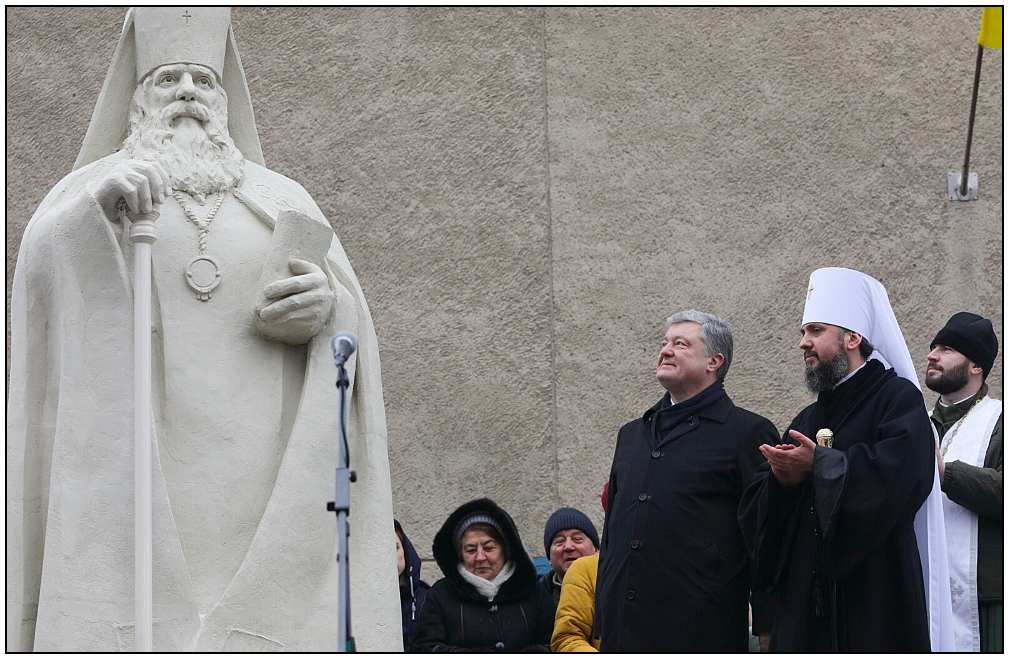 (23 Aug.) This year, the Ukrainian Orthodox Church broke away from Russia, 27 years after Ukraine won independence. But this was not a 27-year battle. Rather, victory came for Ukrainian believers after 100 years of struggle. Eastern Orthodoxy’s highest body, the Ecumenical Church in Istanbul, recognized the Orthodox Church of Ukraine in December.
(23 Aug.) This year, the Ukrainian Orthodox Church broke away from Russia, 27 years after Ukraine won independence. But this was not a 27-year battle. Rather, victory came for Ukrainian believers after 100 years of struggle. Eastern Orthodoxy’s highest body, the Ecumenical Church in Istanbul, recognized the Orthodox Church of Ukraine in December.
Today, the new church is the largest in the country and the fifth-largest Orthodox Church in the world. Almost 49 percent of Ukrainians said in May that they belong to it, far more than any other church, a poll by the Kyiv International Institute of Sociology shows.
The role of the church is more than just spiritual. A separate church for Ukraine goes against the Russian imperial concept of the historic and spiritual unity of Ukrainians and Russians. It contradicts the belief that these nations are part of one country. "The independence of the Orthodox Church in Ukraine was a kind of catastrophe for Moscow," the leader of the new church, Metropolitan Epiphanius, said in April in Lviv. Russia will not be able to get its grip on Ukrainian believers anymore, he said.
Back in 1686, Ecumenical Patriarch Dionysius IV gave legal authority over the Kyiv Orthodox church to Moscow under pressure from the Russian tsar. This move provoked protests by Ukrainian clergy and parishioners. Today, Ukraine’s religious scholars compare it to church annexation.
About 100 years ago, following the break-up of the Russian Empire, Ukrainians made their first big attempt to end their church’s subordination to Russia. In January 1919, the government of the Ukrainian People’s Republic, a short-lived state that existed in 1917–1921, passed a law on the autocephaly — i.e. independence — of the Ukrainian Orthodox Church. The government also sent its envoy to Istanbul to ask the Ecumenical Patriarch to recognize the Ukrainian church.
But that never happened. Moreover, none of the Orthodox bishops supported church independence. So, in October 1921, priests and parishioners consecrated Vasyl Lypkivsky as their metropolitan without bishops and in violation of Orthodox norms. This new church was popular among the people. But after the Soviet Union took control of Ukraine, it suppressed the Ukrainian Autocephalous Church. Most of its priests were imprisoned or killed during the Great Terror of 1930–1937. [read more --]
KAZAKHSTAN: OFFICIALS TRY TO FORCE REGISTRATION SIGNATURE WITHDRAWALS
by Felix Corley: Forum 18 News Service
 (13 Aug.) In Kazakhstan, people who give their names as founders of religious organizations applying for legal status continue to face harassment and intrusive questioning. Officials are harassing founders of religious communities, possibly trying to block applications to exist. In May 2019 police began harassing Oskemen's New Life Church founders as it sought re-registration. Officers visited several late at night, threatening one woman in her late 70s.
(13 Aug.) In Kazakhstan, people who give their names as founders of religious organizations applying for legal status continue to face harassment and intrusive questioning. Officials are harassing founders of religious communities, possibly trying to block applications to exist. In May 2019 police began harassing Oskemen's New Life Church founders as it sought re-registration. Officers visited several late at night, threatening one woman in her late 70s.
Against international law, Kazakhstan bans all exercise of freedom of religion and belief without state permission. Kazakhstan's international human rights obligations also ban officials from compelling individuals to reveal their "thoughts or adherence to a religion or belief." Local religious communities require at least 50 adult citizen founders to be allowed to apply for state registration, thus effectively banning smaller communities from existing. If officials succeed in pressuring enough of the founders of a religious community to remove their signatures, the community would be blocked from obtaining legal status.
In the most recent known case, police in Oskemen (Ust-Kamenogorsk) in East Kazakhstan Region suddenly began harassing the founders of the city's New Life Protestant Church in May 2019, as it was seeking re-registration under a new name. Officers visited several founders late at night, threatening one woman in her late 70s to try to make her open the door. It remains unknown why police needed to question the founders or which government agency had ordered the aggressive and intrusive questioning.
"At present the founders do not think that their rights are being protected by the law or its representatives," Church members stated. "On the contrary, they are being subjected to pressure, which cannot help but arouse concern about the right to freedom of conscience in Kazakhstan." [read more --]
OTHER NEWS HEADLINES:
A BOAT CHURCH IS PARKED FIRMLY IN A MOSCOW FOREST: HERE’S WHY (PHOTOS)
from Russia Today
INTERNATIONAL CONFERENCE IN STUTTGART OPENS THE DOOR FOR THE DIALOGUE BETWEEN ORTHODOX AND EASTERN CATHOLICS
from Religious Information Service of Ukraine
UKRAINIAN AUTOCEPHALOUS ORTHODOX CHURCH CEASES TO EXIST
from Interfax-Religion
IN SAMARA PRAYER HOUSE OF PROTESTANT CHRISTIANS MAY BE DEMOLISHED
from Religia i Pravo
SCHISMATICS CAPTURE A CHURCH OF THE UKRAINIAN ORTHODOX CHURCH AT BOBLY VILLAGE, VOLYN REGION
from Russian Orthodox Church - Moscow Patriarchate
ALBANIA’S FORGOTTEN ORTHODOX CHURCHES ARE BEING RESTORED
from Orthodox Christianity
CHINA: THE WORDS 'GOD' AND 'BIBLE' BANNED IN TEXTBOOKS
from ChristianPersecution.com
UN COMMEMORATES RELIGIOUS PERSECUTION – OPED
from Eurasia Review
HATE CRIMES AGAINST POLAND’S CATHOLICS RISE AFTER PROFANE GAY PARADES
from Church Militant
Click on SUBSCRIBE! to receive your own free copy of Hosken-News!
GO TO: Hosken-News Blog to SHARE THIS ↓ ESSAY with your friends or to WRITE YOUR COMMENTS.
Jesus Christ, the Icon and the Logos of God
In the name of the Father and the Son and the Holy Spirit! Glory to Jesus Christ! Glory forever!
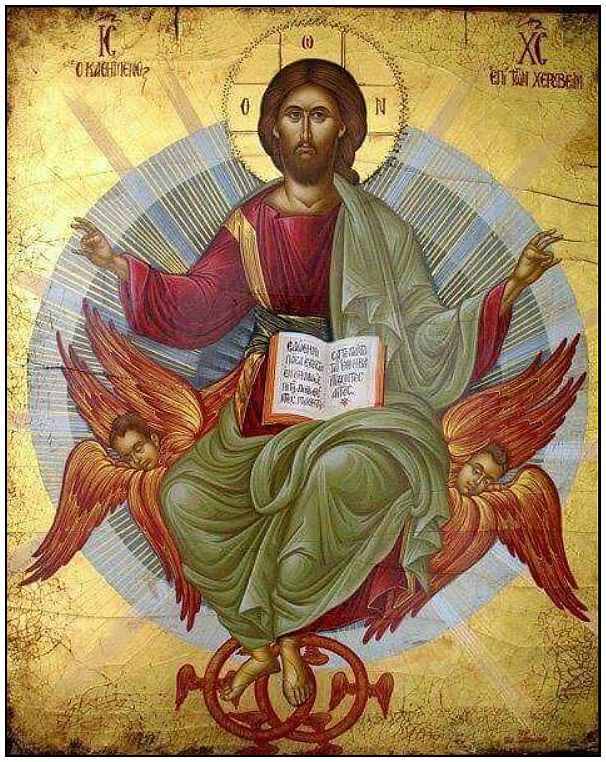 In St. Paul's second letter to the Corinthians, he writes - "- the light of the gospel of the glory of Christ, Who is the image of God" (2 Cor. 4:4). The Greek word here for "image" is "eikon" and it is used also in Colossians 1:15 referring to Jesus Christ: "Who is the image of the invisible God, the firstborn of all creation."
In St. Paul's second letter to the Corinthians, he writes - "- the light of the gospel of the glory of Christ, Who is the image of God" (2 Cor. 4:4). The Greek word here for "image" is "eikon" and it is used also in Colossians 1:15 referring to Jesus Christ: "Who is the image of the invisible God, the firstborn of all creation."
The Apostle John wrote - "No one has seen God at any time. The one and only Son, Who is in the bosom of the Father, He has declared Him" (John 1:18); in other words, Christ has revealed or made known to us the Father. Jesus Christ said to His disciple Philip - "If you have seen Me, you have seen the Father!" (John 14:9). Moses had to put a veil over his face because he had seen just the backside of God. But God the Father, Who formerly could not be seen by human eyes, has now been revealed in the person of Jesus Christ.
In 2 Cor. 3:18 we read - "But we all, with unveiled face seeing the glory of the Lord as in a mirror, are transformed into the same image [eikon] from glory to glory, even as from the Lord, the Spirit." Again, the Apostle of John wrote - "The Word became flesh, and lived among us. We saw His glory, such glory as of the one and only Son of the Father, full of grace and truth" (John 1:14).
So Jesus Christ is also the Logos - the Word of God. Several New Testament texts testify to this fact: "The revelation of Jesus Christ, which God gave Him to show to his servants the things that must soon take place. He made it known by sending his angel to his servant John, who bore witness to The Word of God and to the testimony of Jesus Christ, even to all that he saw" (Revelation 1:1-2); "He is clothed in a robe dipped in blood, and the name by which He is called is The Word of God" (Revelation 19:13); "From his mouth comes a sharp sword --" (v. 15); "-- and take the helmet of salvation, and the sword of the Spirit, which is The Word of God" (Ephesians 6:17); "-- there were heavens from of old, and an earth formed out of water and amid water by The Word of God" (2 Peter 3:5b).
From "Logos" we have the English word "logical" or "rational" - it is the Logos Who makes life make sense, Who gives meaning and purpose to life and the universe: "And He [Christ] is before all things, and in Him all things hold together" (Colossians 1:17).
How can we apply this to our life? The basic idea of deification or theosis is "partaking" or "sharing" as expressed in 2 Peter 1:3-4 – "His divine power has given to us all things that pertain to life and godliness, through the knowledge of Him who called us by glory and virtue, by which have been given to us exceedingly great and precious promises, that through these you may be partakers of the divine nature, having escaped the corruption that is in the world through lust."
The Greek root koinos is found both here and in 1 Corinthians 10:16b-17 – "The bread which we break, is it not the communion of the body of Christ? For we, though many, are one bread and one body, for we all partake of that one bread." So our communion (Gr. "koinonia") is a partaking (Gr. "koinonia") of the divine nature, the body of Christ. St. Peter continues in 2 Peter 1:5-8 to list the many virtues that flow from this koinonia.
Click on SUBSCRIBE! to receive your own free copy of Hosken-News!
In Genesis, we learn that mankind was created in God’s image and likeness. Adam and Eve could walk with and enjoy intimate fellowship with God. But when they sinned, this likeness and fellowship (koinonia) were lost. Fallen mankind continues to bear the image of God but not His likeness. Christ’s incarnation, partaking of our human nature, then His death and resurrection all allow us to begin the process of restoration, partaking of His divine nature and fellowship with Him.
Note the word “allow”: Christ’s incarnation, death, and resurrection do not force us or make all mankind to automatically partake of the divine nature – that would be universalism. Rather, these divine acts permit us to become "God's fellow workers" (Gr. "synergoi"), as St. Paul wrote in 1 Corinthians 3:9: we cooperate with Him to accomplish His will, the restoration of all the cosmos. This cooperation with God is called synergy. It is our free choice, our decision to become coworkers with God or not. Many are called but few are chosen: we must choose to answer the call.
One of the main differences between the eastern and western theological understanding is that the Greeks [Orthodox] focus more on deification and the Latins [Roman Catholics] focus more on redemption. In 1 Corinthians 1:30 St. Paul, however, wrote - "But of Him [the Father] you are in Christ Jesus, who became for us wisdom from God – and righteousness and sanctification and redemption." Here we see the two seemingly different concepts combined: sanctification or holiness (hagiasmos), together with redemption or deliverance (apolutrosis). God the Father's eternal plan is for Christ Jesus, the Sophia and Logos from God, to become both our redemption and our deification or sanctification.
How is it that deification can be identified with sanctification? We have several stories from the lives of those saints who pursued theosis to the point that they actually glowed with the glory of God: The story of St. Seraphim of Sarov is a wonderful example of the peace of God and theosis. Sanctification is becoming a saint, becoming holy, by spending time in the presence of God. St. Paul reminds us – "Pursue peace with all people, and holiness, without which no one will see the Lord" (Hebrews 12:14) If one wants to see the Lord, he must pursue hagiasmos – theosis.
So what we have in 1 Corinthians 1:30 is not opposing concepts, but rather a process: from receiving the Sophia – Logos, the seed implanted in our hearts, to the righteousness of Christ that is imputed to our account, to the redemption that actually releases us from the power of sin, to the sanctification or deification that transforms us into the likeness of Christ – the divine nature. We see this same process in verse 18b – "-- to us who are being saved [a process] it is the power of God." This is the process of being restored back into the likeness of God as in the original creation. Too often in western theology the emphasis is almost entirely on salvation as a one-time event of receiving the seed of the Logos and being accounted as righteous, but it ends there without actually becoming righteous, being sanctified and deified.
This process is not merely a "second blessing" or a "Pentecostal experience" that is peddled by televangelists. Pursuing holiness is like running a long-distance race, as St. Paul described it – "Therefore we also, since we are surrounded by so great a cloud of witnesses, let us lay aside every weight, and the sin which so easily ensnares us, and let us run with endurance the race that is set before us" (Hebrews 12:1).
In that chapter St. Paul describes the chastening of the Lord that comes to genuine sons, but it is "for our profit, that we may be partakers of His holiness. Now no chastening seems to be joyful for the present, but painful --" (vv. 12:10b-11a). This is synergy, working together with God: it’s no picnic! It is a struggle, an endurance race, it requires physical discipline and spiritual muscle training. St. Paul uses the analogy of strengthening hands that hang down and wobbly knees (v. 12). Let us run the race!
In the name of the Father and the Son and the Holy Spirit! Christ is among us! He is and ever shall be!
To keep our websites free, please Support Agape Restoration Society.
Also, please Share Our Vision with your family & friends.
And click on our Amazon Smile link to shop at Amazon!
 Please remember to pray for Christians in socialist countries, and for --
Please remember to pray for Christians in socialist countries, and for --
Your fellow-servants,
Bob & Cheryl
p.s. The answer to the ever-present "Why?" is the everlasting Who.
 (13 Aug.) The movie Unplanned tells the true story of former Planned Parenthood clinic director Abby Johnson and her conversion into a pro-life activist.
(13 Aug.) The movie Unplanned tells the true story of former Planned Parenthood clinic director Abby Johnson and her conversion into a pro-life activist. - 24 Aug. 2019
- 24 Aug. 2019

 "Unplanned"
"Unplanned" (15 Aug.) Many religious communities and human rights defenders strongly oppose Georgian government plans for a restrictive Religion Law. Instead, they call for resolving freedom of religion and belief problems by implementing recommendations made by the Council of Religions under the Public Defender. Georgia's ruling Georgian Dream Party appears to be trying to introduce a restrictive Religion Law that would limit the numbers of religious communities with legal status.
(15 Aug.) Many religious communities and human rights defenders strongly oppose Georgian government plans for a restrictive Religion Law. Instead, they call for resolving freedom of religion and belief problems by implementing recommendations made by the Council of Religions under the Public Defender. Georgia's ruling Georgian Dream Party appears to be trying to introduce a restrictive Religion Law that would limit the numbers of religious communities with legal status. (23 Aug.) Ukraine's chargé d'affaires to the UN Yuriy Vitrenko said that the Russian occupation authorities grossly violate the freedom of conscience and religion in the temporarily occupied territories of Crimea and Donbas. Vitrenko said this during the Arria-Formula Meeting of the UN Security Council for the Protection of Religious Minorities in Armed Conflict, RBC-Ukraine reported citing Ukrinform.
(23 Aug.) Ukraine's chargé d'affaires to the UN Yuriy Vitrenko said that the Russian occupation authorities grossly violate the freedom of conscience and religion in the temporarily occupied territories of Crimea and Donbas. Vitrenko said this during the Arria-Formula Meeting of the UN Security Council for the Protection of Religious Minorities in Armed Conflict, RBC-Ukraine reported citing Ukrinform. (14 Aug.) Two-thirds of Russian citizens (63%) identify as Orthodox, according to a poll done by the Russian Public Opinion Research Center (VCIOM) obtained by Interfax. According to the sociological poll, an overwhelming majority of orthodox Christians (86%) have been baptized and two-thirds of them (66%) were baptized because their parents or relatives had decided so.
(14 Aug.) Two-thirds of Russian citizens (63%) identify as Orthodox, according to a poll done by the Russian Public Opinion Research Center (VCIOM) obtained by Interfax. According to the sociological poll, an overwhelming majority of orthodox Christians (86%) have been baptized and two-thirds of them (66%) were baptized because their parents or relatives had decided so. (23 Aug.) This year, the Ukrainian Orthodox Church broke away from Russia, 27 years after Ukraine won independence. But this was not a 27-year battle. Rather, victory came for Ukrainian believers after 100 years of struggle. Eastern Orthodoxy’s highest body, the Ecumenical Church in Istanbul, recognized the Orthodox Church of Ukraine in December.
(23 Aug.) This year, the Ukrainian Orthodox Church broke away from Russia, 27 years after Ukraine won independence. But this was not a 27-year battle. Rather, victory came for Ukrainian believers after 100 years of struggle. Eastern Orthodoxy’s highest body, the Ecumenical Church in Istanbul, recognized the Orthodox Church of Ukraine in December.